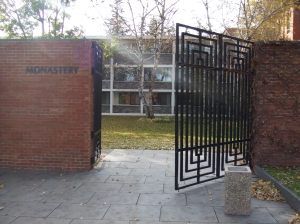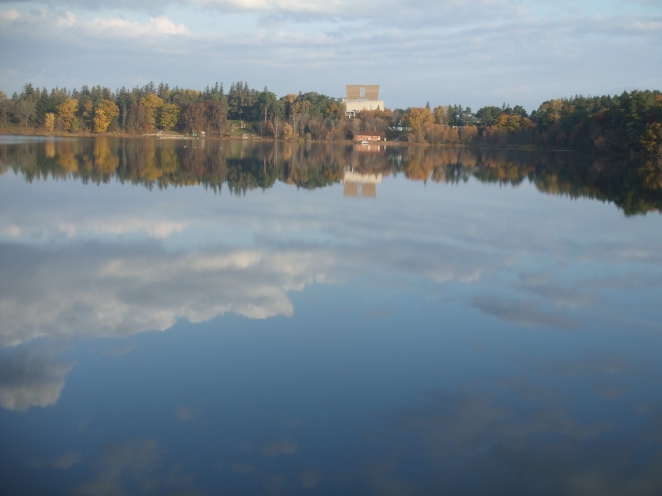It is difficult to convey silence when writing…
Is the the ellipsis appropriate for denoting a moment, minute, or longer of silence? Perhaps a blank page? To be sure, the writer has no control over how long or short the reader may spend in silence. The matter is quite different when we, the writer, read our own words. The well placed pause in a speech, lecture or homily can be all the difference in making an emphatic point or allowing a poignant phrase the time to sink in. Not only does silence struggle to find its voice in the multivalent world of literature – – so too, it does in the broader context of our daily lives. Take a “moment” now, close your eyes and sit in silence…
Was it the length of the silence that was difficult or the thoughts that came racing into your mind? Perhaps both. Why is it that silence scares us? Now, I am generalizing I realize, there are in fact many people that do enjoy silence on occasion. My contention is that our society as a whole does not foster time for silence, and given that is the state of our contemporary climate, it is not conducive to sabbath. First, let us begin with silence.
What is silence? Is it the absence of noise? The presence of calm? Perhaps a combination of the two? Or, is it something else? Is it optical? Or, is it purely aural? What of the other senses? Does silence have a smell, a taste, a touch? Is it a reduction of sensory nerve and brain waves? If we turn to the consensus definition we will find:silence – noun 1. absence of any sound or noise; stillness. It seems as though silence is some amalgamation of lack of motion and lack of sound. It is primarily aural, but there an element of motionlessness. In our post-Enlightenment age, the scientific nature of our society makes silence highly subjective. Is there really ever a moment of absence of any sound or noise; stillness? Even if one were to find the most remote field, cut off from all modern amenities – – completely isolated, would there be silence? No. Of course not, it is impossible, because we know that molecules are always in motion, always bumping into each other, creating friction, motion, and hence noise happens. The earth itself is perpetually in motion, so how can there ever be stillness? I could go on, but you understand my point. Silence, in fact, is subjective; it is subject to the presence of the beholder. Perhaps, then, it is better to consider silence in terms of varying degrees rather than absolutes; it is more silent than it was before, etc.
In search of silence, this highly subjective, e xceedingly elusive, seemingly unattainable state, I headed to those that foster silence as a part of daily life – – the Benedictine monks of St. John’s Abbey. From about 10.30 pm to 7 am, the monks observe silence. What better place than here to examine and experience the state of silence?
xceedingly elusive, seemingly unattainable state, I headed to those that foster silence as a part of daily life – – the Benedictine monks of St. John’s Abbey. From about 10.30 pm to 7 am, the monks observe silence. What better place than here to examine and experience the state of silence?
After rising at 4 am to make the short drive to Collegeville, MN, I arrived at the Abbey Church, and at a quarter to 7, a monk greeted me in the back of the church and directed me to the front where the monks were assembling for morning prayer. Morning prayer opened with a hymn, Frank Von Christerson’s Eternal Spirit of the Living Christ. Indeed, a fitting hymn to start a day of prayer and reflection. There was a scripture reading and then silence…my mind started to wander, and more silence, “what were we waiting for?!”; two whole minutes of silence! We broke the silence by reciting some psalms. The monks were divided into two sections, and we read the psalms in an alternating manner. Simple enough, however, after the first two lines I was uneasy. There was a long pause between each line. I was afraid of coming in at the wrong time, what were we waiting for? The words were right there just read them! And then I realized, that the pause, and silence between each line was deliberate. There was a rhythm to the reading. My uneasiness gave way to a profound calmness. All the tiredness, busy-ness and stress that I had brought with me somehow melted away as my focus was captivated by the words of the psalms. We were reading the psalms, but what is more, I was hearing them as well. The deliberate pauses gave me time to reflect on the words at hand, they not only washed over me, but soaked into me, I absorbed them, and they were real.
After the morning prayer, we then participated in two sessions of lectio divina, something that I was aware of but had never actually participated in formally. The group sessions reinforced my understanding of the value of the audible word. When we hear words spoken aloud by the other, we pick up on things we might not have in silent reading by oneself. The same is true of reading aloud by oneself. Between the sessions we were encouraged to explore the monastic grounds and seek a place of solitude for about an hour for quiet prayer, reading and reflection. Middday prayer was followed by lunch, then another session of lectio divina and finally a time for group reflection on the day’s events.
The group session percolated my attention to the role of silence in society. The learned monk with gray thinning hair, silver rimmed glasses, in his dark frock, leading the session, asked us if we found the length of time provided for silent reading, prayer and reflection adequate, or too long. The present group was anomalous to many of his past groups as we found it to be sufficient, if not too short. Surprised, the monk proceeded to inform us of the inability of past groups to deal with the time to sit in silent reflection, it was too long for them. Tangentially related, he told us a story about serving in another monastery in the south. He drove past a billboard for a wireless provider that simply stated, “Silence is weird.” The advert puzzled the monk, if not angered him. I left feeling as though I was in a minority of sorts given my affinity for silence and solitude. Why is it that silence is weird?
My time at the Abbey among the monks, led me to consider the relationship between silence and time, and hence sabbath. There are a plethora of books by contemporary authors seeking to define Sabbath or recapture the meaning or role of it. One thinks of Wayne Muller, Richard Foster, Abraham Heschel, etc. But in lieu of considering any of those works, I offer the words of Walter Brueggemann, from a recent forum during the winter of 2009. He stated, “What I want to say about the sabbath, is in our society, I think it is to disengage from the production/consumption ideology so that our children see that our lives are not defined by being productive or consumptive. And for me, the key icon for that disengagement is to turn off the television, which is essentially a liturgy of consumption… Sabbath is the kind of idleness that makes possible the recovery of the nefesh that is depleted. People with depleted nefeshes stay angry and anxious and self-preoccupied and ungenerous. My conclusion is you cannot finally sustain a society that does not practice sabbath. And we now live in that society and it cannot be sustained.” Brueggemann, referring to an article by Mark Slouka, “Quitting the Paint Factory,” summarized, “the article says, if you do not take time for thoughtful critical reflection, which I would translate into sabbath, you become a fascist. He says, our society is incapable of thoughtful critical reflection.” Does the inability of thoughtful critical reflection lead to fascism?
Perhaps that question is best addressed elsewhere, but Slouka’s article is highly commended. Not only does he navigate the nature of societal business with erudite effectiveness, I believe that he has grasped the root of many of the problems people and the world face today. Slouka’s prime example of what happens to people that fail to take time for critical self-reflection is George W. Bush. In short, he describes him in the same vein as Filippo Marinetti’s “New Man,” “impatient, almost pathologically unreflective, unburdened by the past.” Certainly Slouka’s example is not representative of all cases, but rather one alarming example of what perpetual business is capable of producing in society. So how then does lack of critical reflection relate to silence and sabbath?
For me, I see the relationship between silence and sabbath as mutually reciprocal. Each is capable of leading to the other, though neither one is essential for the other necessarily. In the same way, silence and self-reflection are related. As the monk at St. John’s told me, “silence makes you self aware, you have to stop and realize you are alive.” The monk also said he wished he could take out a tv ad with a black screen that simply said, “a moment of silence,” compliments of St. Leo Abbey. It seems as though many people would not be able to sit through a full 30 seconds of silence in a day, let alone 60. Such a notion is counter intuitive to the modus operandi of society at large. Time, silence, reflection and sabbath are interrelated and necessary for healthy living and self-awareness. Indeed, when we take the time for sabbath, silence, or both, we allow the silence to have its say.
